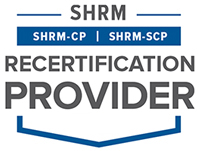+1-800-385-1627
support@hrtrainonline.com
0 items
Coaching Skills for Managers: Tools to get the Most from your Team!
February 5, 2025
10:00 AM PST | 01:00 PM EST
60 Minutes
36456

Group Attendees: Any number of participants
Recorded Version: Unlimited viewing for 6 months ( Access information will be emailed 24 hours after the completion of live webinar)

The use of this seal confirms that this activity has met HR Certification Institutes (HRCI) criteria for recertification credit pre-approval.
This activity has been approved for
1 HR
(General) recertification credit
 HRTrainOnline is recognized by SHRM to offer Professional Development Credits (PDCs) for the SHRM-CP® or SHRM-SCP®.
?
HRTrainOnline is recognized by SHRM to offer Professional Development Credits (PDCs) for the SHRM-CP® or SHRM-SCP®.
?
1-hour and 15 minute concurrent conference session = 1.25 PDCs.
3-hour e-learning course = 3 PDCs.
Today's leaders recognize the need to maximize productivity in their team and that can only happen when employees are committed and engaged.
It's no surprise that actively engaged employees are 20 to 40 percent more productive in the workplace than those that aren't engaged.In order to have a team of high performing and successful employees, you need to know the best techniques to engage and motivate them. Not only does it make your job easier, coaching greatly improves employee performance when done correctly.
While once considered a "soft" skill, coaching for high performance is now recognized as an effective method that produces better decision-making skills, improved project management, and increased performance while lowering overall turnover.
Why you should Attend: Many of us came to our roles and positions in life/work with great technical training and experience. It is what made us promotable into leadership roles. But many of us are not very good coaches, we think we are because we are good at doing the work, but it turns out we are not very good teachers, instructors, coaches.
Not our fault, just not our innate gift. Like some people are not the best at performing the tasks or even playing the game (think of any physical activity) but are terrific coaches! Why or How does that happen and make them successful in that arena?
Most outstanding coaches have 4 talents: The understanding of the technical requirements, terrific observational skills, communication and relationship building capabilities. And they can link those skills and abilities with the mental and emotional requirements for improving individual and team performance. Do they hold people accountable - Yes!
If you want to improve your team’s performance or that of individuals, even yourself, then perhaps you will find a missing piece in this webinar or an area where as a “Coach” you too can improve. Coaches need Coaches!
Areas Covered in the Session:
- Help you understand how to tap into employee commitment
- Unravel what engages and disengages employees
- Detail the 6 key skills necessary for effective coaching
- Share a useable 5-step model for conducting a coaching session
- Clarify the differences between coaching, mentoring, teaching, and directing
- Provide over 44 questions to drive action and accountability
Who Will Benefit:
- Team leaders
- Managers
- Supervisors
- Directors
- Coaches
 Bob Verchota is owner and senior consultant for RPVerchota & Associates, a consulting firm providing services to clients who seek to align their business and employees, creating successful outcomes and excellent work environments. After 30+ years in Human Resources senior leadership roles and teaching both undergraduate and graduate courses in Leadership and Organizational Development, Bob transitioned to using his experience and skills in consulting.
Bob Verchota is owner and senior consultant for RPVerchota & Associates, a consulting firm providing services to clients who seek to align their business and employees, creating successful outcomes and excellent work environments. After 30+ years in Human Resources senior leadership roles and teaching both undergraduate and graduate courses in Leadership and Organizational Development, Bob transitioned to using his experience and skills in consulting.
Mr. Verchota provides solutions to companies for a wide variety of HR issues including training and development, compensation, compliance, policy development, performance management, employee relations and managing change from mergers and acquisitions to project specific disruptions of the status quo.
Bob has an undergraduate degree in Business Administration, graduate degree in Healthcare Administration, and doctoral work (ABD) in Organizational Development. He is a lifetime Senior Professional in Human Resources.
